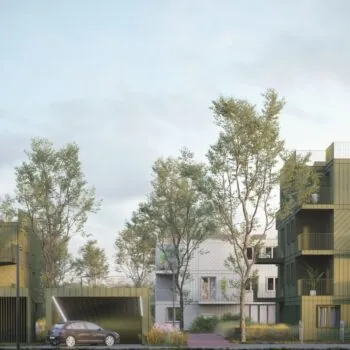A coalition of architects, housing organisations, energy companies, financial institutions, installers, manufacturers, aviation firms and civil society have written to the UK Minister for Housing to seek confirmation that there will be no new gas grid connections permitted under the Future Homes Standard, in line with the UK’s energy security and climate goals.
This is a key policy decision to ensure that new homes are fit for the future, alongside high fabric performance, to position the UK as a leader in clean heat.
A clear, long-term signal helps spur investment in British clean tech supply chains, skills and training
The Future Homes Standard will set out requirements for newly built homes to ensure a high energy performance, with electric technologies such as heat pumps anticipated to be the primary heating source, as well as low carbon heat networks. Heat pumps are an established technology, with approximately 59 million installed across Europe and over 190 million worldwide.
Heat pumps support energy security as they are 3-4 times more efficient than gas boilers, and significantly reduce household fossil gas usage. The UK has a target to install 600,000 heat pumps per year by 2028. However, we continue to lag far behind the rest of Europe on installation rates, having only installed 40,000 in 2022.
The new build market will be key for decarbonising heat and getting on track for energy security and climate targets. Clear policy signals through the Future Homes Standard are vital to spur private investment, boosting British manufacturing and skills by providing the clean heat market confidence to grow supply chains.
Ensuring no fossil fuel loopholes
It is critically important that the Future Homes Standard does not allow new homes to be connected to the gas grid, and we seek confirmation from the government that this will be the case. There is a risk that allowing ‘hydrogen-ready’ boilers to be installed under the Future Homes Standard could create a loophole which would allow new homes to be connected to the gas grid and burn fossil fuels for years to come.
100% hydrogen for heating is not yet a tried and tested technology, and unlikely to be available for decades – and even then, unlikely to be economic as a nationwide solution for domestic heat decarbonisation.
While hydrogen will be essential for decarbonising sectors including power and aviation, the House of Commons Science and Technology Select Committee has concluded hydrogen will have a limited role in replacing gas in heating homes.
Allowing hydrogen-ready boilers and new connections to the gas grid could lock new homeowners into polluting fossil fuels, and put them at risk of costly retrofits in the likely case that the domestic gas grid is never fully converted to green hydrogen.
Signatories
E3G
Nationwide Building Society
Abundance Investment
Coventry Building Society
E.ON
Octopus
Sustainable Aviation
Good Energy
Principality Building Society
Royal Institution of Chartered Surveyors
Energy UK
Ecology Building Society
UK Green Building Council
Airlines UK
ADS Group
Ground Source Heat Pump Association
Kensa Group
Ambue
Nesta
ECD Architects
Solar Thermal UK
End Fuel Poverty Coalition
Friends of the Earth
Power for People
ep group
Green Alliance
Uplift
Global Witness
Heat Pump Federation
Regen
Greenpeace UK
WWF UK
ICAX
MCS Charitable Foundation
Positive Money
Environmental Justice Foundation
Chartered Institute of Housing
Architects Climate Action Network
NATIVE STUDIO
Transition by Design
Parents for Future UK


